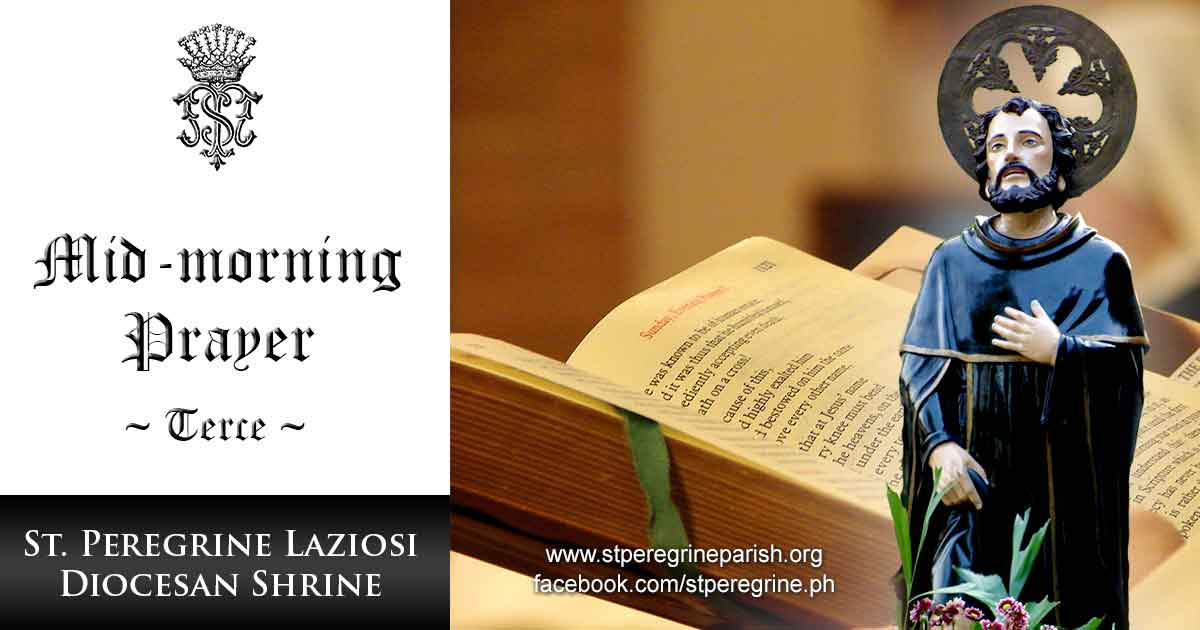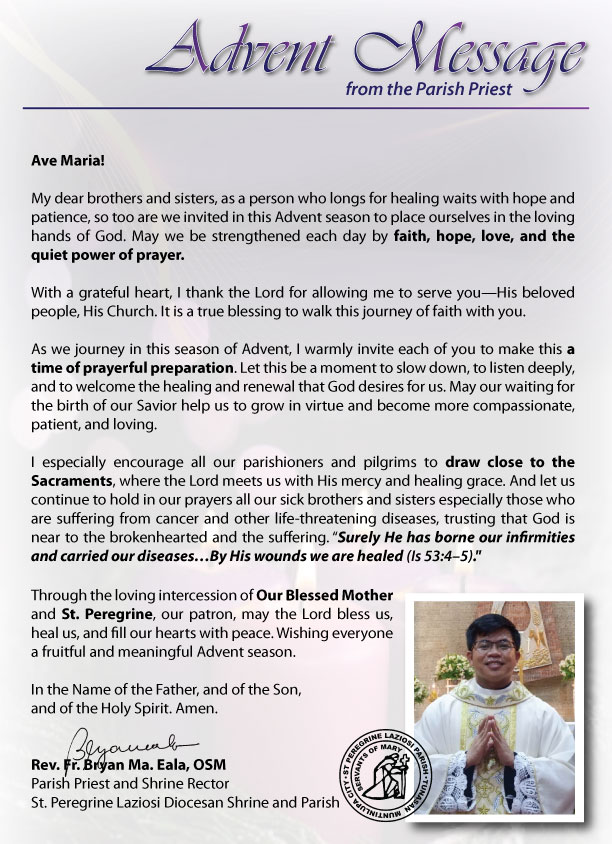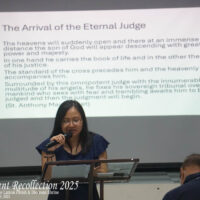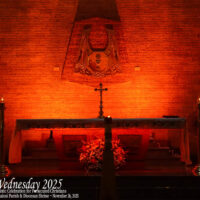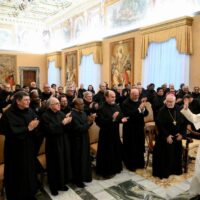Ribbon Placement:
Liturgy of the Hours Vol. III:
Ordinary: 651
Proper of Seasons: 176
Psalter: Tuesday, Week I, 722
Office of Readings for Tuesday in Ordinary Time
God, come to my assistance.
— Lord, make haste to help me.
Glory to the Father, and to the Son, and to the Holy Spirit:
— as it was in the beginning, is now, and will be for ever. Amen. Alleluia.
HYMN
O God, our help in ages past,
Our hope for years to come,
Our shelter from the stormy blast,
And our eternal home.
Beneath the shadow of Your throne
Your saints have dwelt secure;
Sufficient is your arm alone,
And our defense is sure.
Before the hills in order stood,
Or earth received her frame,
From everlasting you are God,
To endless years the same.
A thousand ages in your sight
Are like an evening gone;
Short as the watch that ends the night
Before the rising sun.
Time, like an ever rolling stream,
Bears all our lives away;
They fly, forgotten, as a dream
Dies at the opening day.
O God, our help in ages past,
Our hope for years to come,
Be now our guard while troubles last,
And our eternal home.
| 𝄞 | “O God, Our Help in Ages Past” by Melinda Kirigin-Voss, Vince Clark • Title: O God, Our Help in Ages Past; Text: Based on Psalm 90; Isaac Watts, 1674-1748, Psalms of David…, 1719, alt.; Tune: ST. ANNE, CM; later form of melody (rhythm adapted), attr. to William Croft, 1678-1727, A Supplement to the New Version of Psalms, 1708; Artist: Melinda Kirigin-Voss, Vince Clark; Copyright 2016 Surgeworks Inc. • Albums that contain this Hymn: Divine Office |
PSALMODY
Ant. 1 The Lord is just; he will defend the poor.
Psalm 10
Prayer of thanksgiving
Blessed are the poor; the kingdom of heaven is theirs (Luke 6:20).
I
Lord, why do you stand afar off
and hide yourself in times of distress?
The poor man is devoured by the pride of the wicked:
he is caught in the schemes that others have made.
For the wicked man boasts of his heart’s desires;
the covetous blasphemes and spurns the Lord.
In his pride the wicked says: “He will not punish.
There is no God.” Such are his thoughts.
His path is ever untroubled;
your judgment is far from his mind.
His enemies he regards with contempt.
He thinks: “Never shall I falter;
misfortune shall never be my lot.”
His mouth is full of cursing, guile, oppression,
mischief and deceit under his tongue.
He lies in wait among the reeds;
the innocent he murders in secret.
His eyes are on the watch for the helpless man.
He lurks in hiding like a lion in his lair;
he lurks in hiding to seize the poor;
he seizes the poor man and drags him away.
He crouches, preparing to spring,
and the helpless fall beneath his strength.
He thinks in his heart: “God forgets,
he hides his face, he does not see.”
Glory to the Father, and to the Son, and to the Holy Spirit:
— as it was in the beginning, is now, and will be for ever. Amen.
Ant. The Lord is just; he will defend the poor.
Ant. 2 Lord, you know the burden of my sorrow.
II
Arise then, Lord, lift up your hand!
O God, do not forget the poor!
Why should the wicked spurn the Lord
and think in his heart: “He will not punish”?
But you have seen the trouble and sorrow,
you note it, you take it in hand.
The helpless trusts himself to you;
for you are the helper of the orphan.
Break the power of the wicked and the sinner!
Punish his wickedness till nothing remains!
The Lord is king for ever and ever.
The heathen shall perish from the land he rules.
Lord, you hear the prayer of the poor;
you strengthen their hearts; you turn your ear
to protect the rights of the orphan and oppressed
so that mortal man may strike terror no more.
Glory to the Father, and to the Son, and to the Holy Spirit:
— as it was in the beginning, is now, and will be for ever. Amen.
Psalm-prayer
Rise up, Lord, in defense of your people; do not hide your face from our troubles. Father of orphans, wealth of the poor, we rejoice in making you known; may we find comfort and security in times of pain and anxiety.
Ant. Lord, you know the burden of my sorrow.
Ant. 3 The words of the Lord are true, like silver from the furnace.
Psalm 12
A cry for God’s help against powerful oppressors
The Father sent his Son into the world to defend the poor (Saint Augustine).
Help, O Lord, for good men have vanished:
truth has gone from the sons of men.
Falsehood they speak one to another,
with lying lips, with a false heart.
May the Lord destroy all lying lips,
the tongue that speaks high sounding words,
those who say: “Our tongue is our strength;
our lips are our own, who is our master?”
“For the poor who are oppressed and the needy who groan
I myself will arise,” says the Lord.
“I will grant them the salvation for which they thirst.”
The words of the Lord are words without alloy,
silver from the furnace, seven times refined.
It is you, O Lord, who will take us in your care
and protect us for ever from this generation.
See how the wicked prowl on every side,
while the worthless are prized highly by the sons of men.
Glory to the Father, and to the Son, and to the Holy Spirit:
— as it was in the beginning, is now, and will be for ever. Amen.
Psalm-prayer
Your light is true light, Lord, and your truth shines like the day. Direct us to salvation through your life-giving words. May we be saved by always embracing your word.
Ant. The words of the Lord are true, like silver from the furnace.
Sacred Silence (indicated by a bell)
A moment to reflect and receive in our hearts the full resonance of the voice of the Holy Spirit and to unite our personal prayer more closely with the word of God and public voice of the Church.
The Lord teaches the humble his way.
— He guides the gentle-hearted along the right path.
READINGS
First reading
From the letter to the Galatians
2:11—3:14
The just man shall live by faith
When Cephas came to Antioch I directly withstood him, because he was clearly in the wrong. He had been taking his meals with the Gentiles before others came who were from James. But when they arrived he drew back to avoid trouble with those who were circumcised. The rest of the Jews joined in his dissembling, till even Barnabas was swept away by their pretense.
As soon as I observed that they were not being straightforward about the truth of the gospel, I had this to say to Cephas in the presence of all: “If you who are a Jew are living according to Gentile ways rather than Jewish, by what logic do you force the Gentiles to adopt Jewish ways?”
We are Jews by birth, not sinners of Gentile origin. Nevertheless, knowing that a man is not justified by legal observance but by faith in Jesus Christ, we too have believed in him in order to be justified by faith in Christ, not by observance of the law; for by works of the law no one will be justified. But if, in seeking to be justified in Christ, we are shown to be sinners, does that mean that Christ is encouraging sin? Unthinkable! If, however, I were to build up the very things I had demolished, I should then indeed be a transgressor. It was through the law that I died to the law, to live for God. I have been crucified with Christ, and the life I live now is not my own; Christ is living in me. I still live my human life, but it is a life of faith in the Son of God, who loved me and gave himself for me. I will not treat God’s gracious gift as pointless. If justice is available through the law, then Christ died to no purpose!
You senseless Galatians! Who has cast a spell over you—you before whose eyes Jesus Christ was displayed to view upon his cross? I want to learn only one thing from you; how did you receive the Spirit? Was it through observance of the law or through faith in what you heard? How could you be so stupid? After beginning in the spirit, are you now to end in the flesh? Have you had such remarkable experiences all to no purpose—if indeed they were to no purpose? Is it because you observe the law or because you have faith in what you heard that God lavishes the Spirit on you and works wonders in your midst?
Consider the case of Abraham: he “believed God, and it was credited to him as justice.” This means that those who believe are sons of Abraham. Because Scripture saw in advance that God’s way of justifying the Gentiles would be through faith, it foretold this good news to Abraham: “All nations shall be blessed in you.” Thus it is that all who believe are blessed along with Abraham, the man of faith.
All who depend on observance of the law, on the other hand, are under a curse. It is written, “Cursed is he who does not abide by everything written in the book of the law and carry it out.” It should be obvious that no one is justified in God’s sight by the law, for “the just man shall live by faith.” But the law does not depend on faith. Its terms are: “Whoever does these things shall live by them.”
Christ has delivered us from the power of the law’s curse by himself becoming a curse for us, as it is written: “Accursed is anyone who is hanged on a tree.” This has happened so that through Christ Jesus the blessing bestowed on Abraham might descend on the Gentiles in Christ Jesus, thereby making it possible for us to receive the promised Spirit through faith.
RESPONSORY Galatians 2:16, 21
A man is not justified by observing the law, but through faith in Jesus Christ.
— We have believed in Christ Jesus so that we might be made holy not through the observance of the law but by faith in him.
If holiness comes through keeping the law, then Christ died in vain.
— We have believed in Christ Jesus so that we might be made holy not through the observance of the law but by faith in him.
Second reading
From a homily on Genesis by Origen, priest
The sacrifice of Abraham
Abraham took wood for the burnt offering and placed it upon Isaac his son, and he took fire and a sword in his hands, and together they went off. Isaac himself carries the wood for his own holocaust: this is a figure of Christ. For he bore the burden of the cross, and yet to carry the wood for the holocaust is really the duty of the priest. He is then both victim and priest. This is the meaning of the expression: together they went off. For when Abraham, who was to perform the sacrifice, carried the fire and the knife, Isaac did not walk behind him, but with him. In this way he showed that he exercised the priesthood equally with Abraham.
What happens after this? Isaac said to Abraham his father: Father. This plea from the son was at that instant the voice of temptation. For do you not think the voice of the son who was about to be sacrificed struck a responsive chord in the heart of the father? Although Abraham did not waver because of his faith, he responded with a voice full of affection and asked: What is it, my son? Isaac answered him: Here are the fire and the wood, but where is the sheep for the holocaust? And Abraham replied: God will provide for himself a sheep for the holocaust, my son. The careful yet loving response of Abraham moves me greatly. I do not know what he saw in spirit, because he did not speak of the present but of the future: God will provide for himself a sheep. His reply concerns the future, yet his son inquires about the present. Indeed, the Lord himself provided a sheep for himself in Christ.
Abraham extended his hand to take the sword and slay his son, and the angel of the Lord called to him from heaven and said: Abraham, Abraham. And he responded: Here I am. And the angel said: Do not put your hand upon the boy or do anything to him, for now I know that you fear God. Compare these words to those of the Apostle when he speaks of God: He did not spare his own Son but gave him up for us all. God emulates man with magnificent generosity. Abraham offered to God his mortal son who did not die, and God gave up his immortal Son who died for all of us.
And Abraham, looking about him, saw a ram caught by the horns in a bush. We said before that Isaac is a type of Christ. Yet this also seems true of the ram. To understand how both are figures of Christ—Isaac who was not slain and the ram who was—is well worth our inquiry.
Christ is the Word of God, but the Word became flesh. Christ therefore suffered and died, but in the flesh. In this respect, the ram is the type, just as John said: Behold the lamb of God, behold him who takes away the sins of the world. The Word, however, remained incorruptible. This is Christ according to the spirit, and Isaac is the type. Therefore, Christ himself is both victim and priest according to the spirit. For he offers the victim to the Father according to the flesh, and he is himself offered on the altar of the cross.
RESPONSORY John 19:16-17; Genesis 22:6
They took charge of Jesus and led him away;
— and carrying his own cross, he went out to what is called the place of the skull.
Abraham took up the wood for the sacrifice and put it on the shoulders of Isaac, his son.
— And carrying his own cross, he went out to what is called the place of the skull.
CONCLUDING PRAYER
Keep your family safe, O Lord,
with unfailing care, that,
relying solely on the hope of heavenly grace,
they may be defended always by your protection.
Through our Lord Jesus Christ, your Son,
who lives and reigns with you in the unity of the Holy Spirit,
God, for ever and ever.
— Amen.
ACCLAMATION (at least in the communal celebration)
Let us praise the Lord.
— And give him thanks.
 Diocese of Parañaque
Diocese of Parañaque


